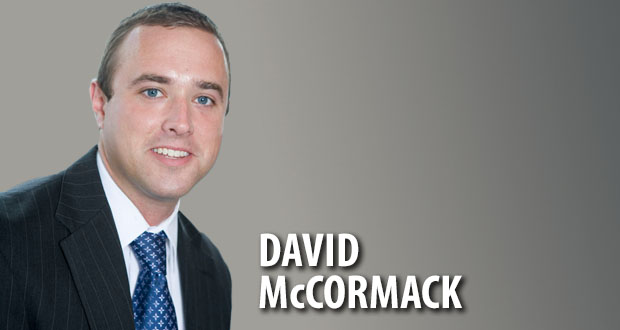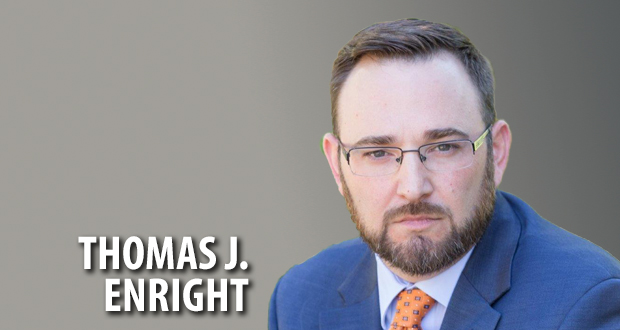
Sees ruling as ‘pendulum swing’ in right direction
In a split decision, a three-judge panel of the 1st U.S. Circuit Court of Appeals has reiterated that the pleading standard for a retaliation claim under the federal False Claims Act differs from the standard applicable in a suit alleging an actual false claim.
The FCA prohibits any person from “knowingly present[ing] or caus[ing] to be presented, a false or fraudulent claim” to the federal government and also bars an employer from retaliating against an employee who acts to prevent FCA violations.
A U.S. District Court judge granted the defendants’ motion to dismiss Thomas Guilfoile’s retaliation complaint, finding the plaintiff did not put forth sufficient facts to show that he was engaged in protected conduct within the meaning of the FCA.
But writing for the panel’s majority, Judge Kermit V. Lipez disagreed and vacated the dismissal, noting the “crucial” difference in the standards.
“Put colloquially, rather than plausibly pleading the existence of a fire — the actual submission of a false claim — a plaintiff alleging FCA retaliation need only plausibly plead a reasonable amount of smoke — conduct that could reasonably lead to an FCA action based on the submission of a false claim,” Lipez wrote.
Retaliation plaintiffs need not meet Federal Rule of Civil Procedure 9(b)’s heightened pleading requirements for cases pertaining to fraud, the judge added.
The 45-page decision is Guilfoile v. Shields, et al., Lawyers Weekly No. 01-010-19.
Retaliation standard
FCA practitioner Louise A. Herman said the ruling’s value lies in its reaffirmation of the distinction between what is required to be put forth in a retaliation claim versus an action alleging a false claim.
“It appears the lower court held the plaintiff to a more stringent standard, which is not required in a retaliation case,” the East Providence lawyer said. “Retaliation claims in general are brought under a variety of statutes, none of which require the Rule 9(b) standard of particularity.”
With Rule 9(b) requiring a party to spell out the who, what, where, when and why of an alleged fraud, Herman said an FCA plaintiff often will plead with as many examples as possible of the false claims that were made to bolster that specificity requirement.
“But for retaliation it is different. It’s just like any other complaint that needs to satisfy the Twombly plausibility standard,” she said, referring to the U.S. Supreme Court’s 2007 ruling in Bell Atlantic Corp. v. Twombly.
Herman added that the District Court judge apparently also required the plaintiff to show materiality, which the 1st Circuit emphasized in its opinion is required neither in a retaliation claim nor under the Anti-Kickback Statute following an amendment in 2010.
“With violations of the AKS, you don’t need to show materiality whether the claim involves retaliation or concerns the underlying violation,” Herman said. “And if you make out a claim under the AKS, it is a per se claim under the FCA. The two statutes intersect.”
Thomas J. Enright of Cranston, Rhode Island, said he thought the decision provided necessary clarity with FCA and other types of retaliation claims.
He pointed to the Rhode Island Whistleblowers’ Protection Act, which protects employees who “reasonably believe” that a violation of the law “has occurred or is about to occur.”
“The court in this case expressly rejected bare allegations of a ‘reasonable belief’ in the illegality of the employer’s alleged conduct,” Enright said. “Instead, in this case, as with all whistleblower retaliation claims, the court will look behind the allegation and examine the facts relevant to the reasonableness of the employee’s subjective belief.”
In the end, Enright said he thought the majority got it right.
“Employees are one of the best sources of information related to illegal conduct by businesses, and they must feel comfortable alerting their employers or relevant third parties of potential illegalities,” he said. “Holding them to too high a standard will deter whistleblowing, and anti-retaliation provisions must be read broadly for those protections to have any effect.”
David P. McCormack of the Boston law firm Sugarman viewed the holding from a broader plaintiff’s perspective in federal court.
“Setting aside the particulars, this decision is important in a fundamental sense: It is a pendulum swing back in the correct direction of standards relating to pleadings,” McCormack said.
Over the years, courts and legislatures have added more and more obstacles for plaintiffs to survive a motion to dismiss without the benefit of discovery, he added.
“The 1st Circuit seems to have taken a more common sense approach where it was clear that the plaintiff had pleaded sufficient facts to withstand a motion to dismiss,” he said.
According to McCormack, motions to dismiss are often allowed by courts based on technical arguments requiring a word-for-word parsing of the complaint. When those decisions are appealed, parties can spend years litigating the sufficiency of the pleadings rather than the actual merits of the case.
“Motions to dismiss, especially in the federal courts, have been turned into a litigation weapon for defendants, and their overuse has stripped away some of the true intent behind them — the weeding out of obviously unproven and unrecognized claims,” he said. “The 1st Circuit’s decision in Guilfoile hopefully will be one of many decisions that end the overuse of these motions.”
The plaintiff-appellant’s counsel, Paul W. Mollica of Chicago and Tammy T. Marzigliano of New York, did not respond to requests for comment. Similarly, the defendant constituent companies’ attorneys — Brian J. Leske, Michael J. Sullivan, Walter B. Prince, William A. Worth, David C. Casey and Stephen T. Melnick, all of Boston — did not respond by press time.

“Employees are one of the best sources of information related to illegal conduct by businesses … . Holding them to too high a standard will deter whistleblowing, and anti-retaliation provisions must be read broadly for those protections to have any effect.”
— Thomas J. Enright, Cranston, Rhode Island
Kickback scheme alleged
The plaintiff-appellant, Thomas Guilfoile, was hired in 2013 as president of an “integrated entity” made up of several health care LLCs, joint ventures and holding companies working in concert to provide specialty pharmacy services for chronically ill patients.
The companies process subscriptions, bill insurance, and ensure that patients adhere to medical regimens. Federal insurance programs, including Medicare and Medicaid, are billed for services provided.
The CEO of the combined entities, John Shields, had previously entered into a contract with a consultant, Michael Greene, whereby Greene was paid “referral fees” for steering hospital contracts to Shields.
In fall 2015, Guilfoile notified Shields that he believed the contract violated the federal Anti-Kickback Statute in that Greene was paid to secure contracts with hospitals that resulted in the integrated entity making claims for payment to federal insurance programs.
After some back and forth on the matter, Shields terminated Guilfoile that December. Guilfoile then sent a letter to the board of directors, sharing his concerns that the integrated entity violated the law in paying Greene for referrals of federally insured patients.
In April 2016, Guilfoile brought suit against the integrated entity and Shields, alleging that his firing constituted whistleblower retaliation in violation of the FCA.
However, the District Court dismissed the complaint, finding that Guilfoile failed to adequately plead that he was engaged in “protected conduct,” the first element of an FCA retaliation claim.
Pleadings adequate
Based on an examination of the pleading standards and the fact that Guilfoile had not brought a “direct” claim of an FCA violation, the 1st Circuit panel vacated and remanded.
“In a suit directly alleging the submission of a false claim, a plaintiff must sufficiently plead facts supporting the existence of an actual false claim,” Lipez wrote. “However, in a suit alleging retaliation under the FCA, a plaintiff must sufficiently plead that he or she was retaliated against based on ‘conduct that reasonably could lead to a viable FCA action.’”
With that polestar, the court concluded that Guilfoile’s pleadings met the bar.
“The allegations in the complaint, coupled with the reasonable inferences we must draw from them, plausibly pleaded that the claims for payment were, or were going to be, submitted to the government in connection with the Integrated Entity’s work with the … hospitals,” Lipez wrote.
He added that, “[i]f not for the agreement with Greene, the Integrated Entity would not have been in a position to benefit from the federal health care payments arising from its work with the hospitals.”
Part of the equation, Lipez explained, is that a federal health care payment that violates the AKS is a per se false claim under the FCA. And Guilfoile adequately alleged that the payments to Greene were contrary to the AKS, the panel concluded, as the relationship between the integrated entity and Greene had the “hallmarks of a kickback scheme.”
Lipez wrote that the facts are “materially indistinguishable” from the scheme in 1989’s United States v. Bay State Ambulance & Hospital Rental Service, Inc., which involved a criminal conviction under the AKS in which a person wielded his influence to win an ambulance services contract.
“The type of scheme proven in Bay State and alleged in the present case is in the heartland of what the AKS is intended to prevent — the use of payments to improperly influence decisions on the provision of health care that lead to claims for payment to federal health care programs,” Lipez said.
Dissenting was Judge David J. Barron, who expressed concern about the “attenuated” nature of the AKS scheme alleged in the complaint and doubted that it could “reasonably lead” to an FCA action.
Barron argued there was too great a distance between the entity’s payments to Greene to capture hospital contracts and the submission of claims to federal insurance programs.
 New England Biz Law Update
New England Biz Law Update
